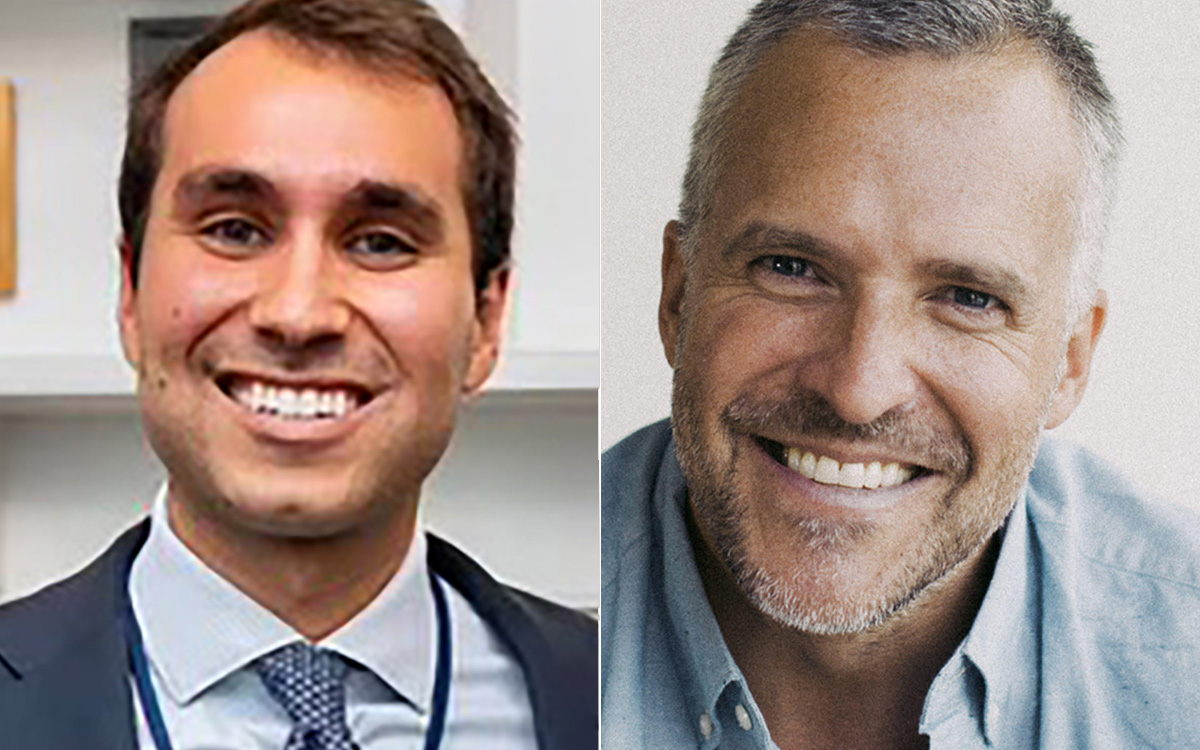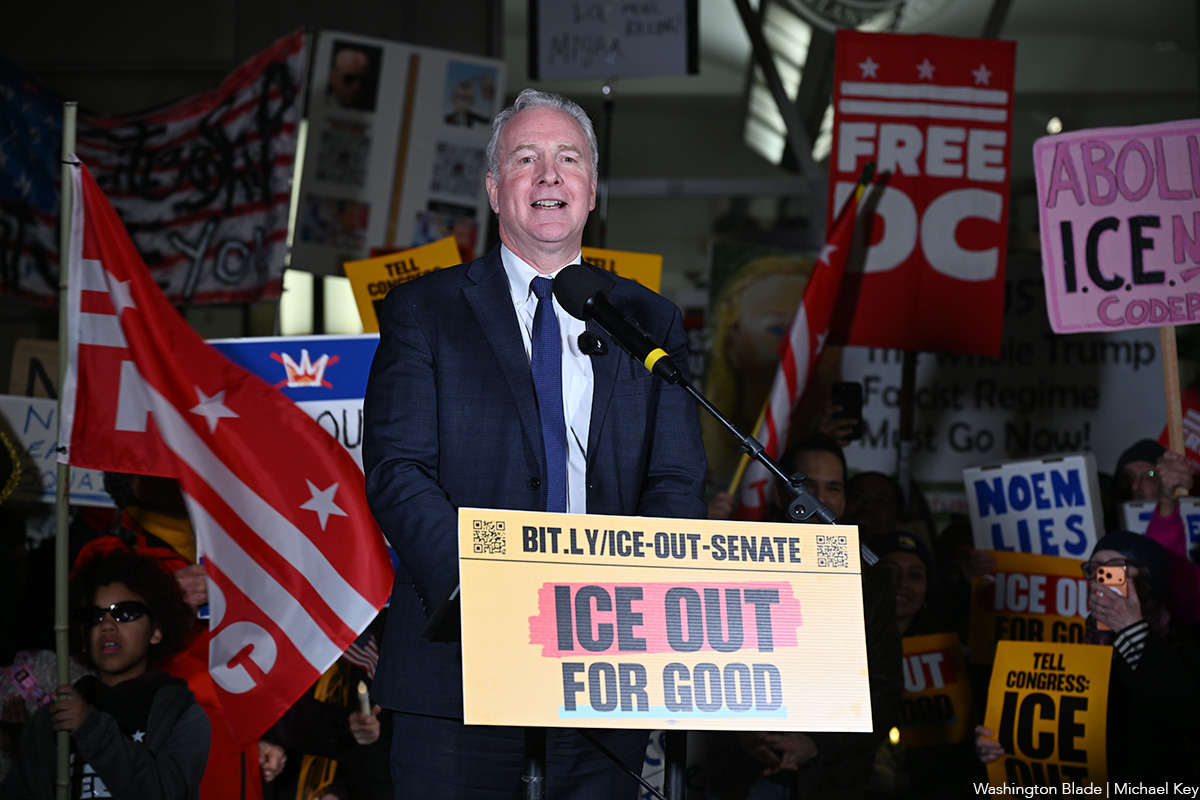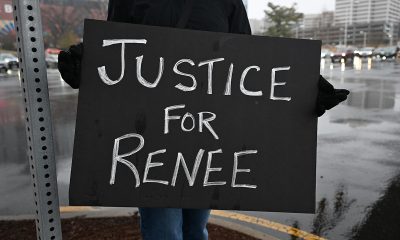Politics
EXCLUSIVE: Meet the LGBTQ staff working on Biden’s re-election campaign
Munoz, Gifford view 2024 as existentially important

(Editor’s note: This is the first in a three-part series profiling senior LGBTQ staff working on President Biden’s re-election campaign. Part two will be published next week.)
The Biden-Harris administration has made history with the number and seniority of its LGBTQ appointees — a fact that is perhaps almost as familiar as the faces of America’s first openly gay Cabinet-level official, Transportation Secretary Pete Buttigieg, or Karine Jean-Pierre, who is both the first Black woman and the first lesbian White House press secretary.
Queer people are also helping to lead the largely behind-the-scenes, grueling reelection effort, and last week the Washington Blade spoke with five of them at the campaign’s headquarters in Wilmington, Del., and another remotely over Zoom.
The campaign’s spokesperson Kevin Munoz and finance chair Rufus Gifford, both gay men, view next year’s election and its stakes for LGBTQ Americans, for all Americans, as existentially important.
So, too, do the staff who will be profiled in Parts 2 and 3 of this series: Sergio Gonzales, senior adviser to Vice President Kamala Harris; Rubi Flores, special assistant to campaign manager Julie Chávez Rodríguez; Becca Siegel, senior adviser to the campaign; and Teresa Tolliver, director of operations for the campaign.
Each brings diversity with respect to both identity and experience to their roles.
“I entered politics as someone that had worked in advertising,” Munoz told the Blade.
Joining the Biden for President campaign in 2019 as the Nevada press secretary without much experience liaising with reporters or drafting press releases, Munoz said he promised to “work like the Dickens on the things that I [didn’t] know enough about.”
After joining team Biden in Las Vegas, he would go on to serve as an assistant White House press secretary, working on critically important matters, including the administration’s response to COVID and other public health crises, before joining the campaign last March.
Throughout, Munoz said, “There’s never been an environment in which I haven’t felt really comfortable to be myself and really able to use my background, as someone from Florida, as a Latino, as a gay man, to my advantage and to be able to speak about issues that uniquely impact me or people like me.”
“When I was at the White House,” he said, “I had the opportunity to work on LGBT issues as it relates to health care,” including with the emergence of mpox, which “was uniquely impacting” gay men.
Munoz remembers that as the National Security Council — which is responsible for handling outbreaks of disease at their early outset — held a briefing, “I said to some colleagues and the powers that be, this guy is going to be the guy that is able to talk candidly and be credible and trusted, and also talk about all the wonky public health things all at once.'”
He was referring to Dr. Demetre Daskalakis, who was director of the Division of HIV/AIDS Prevention at the Centers for Disease Control and Prevention before the White House named him deputy coordinator of the national mpox response in 2022 — a move that, Munoz said, demonstrated that the administration “understands the need to have LGBTQ people at the table and really leading the response on something like this.”
Munoz is also from Florida. In March, “We had to lead the response when ‘Don’t Say Gay’ was just becoming an issue,” he said, during which time the bill was signed into law by the state’s Republican Gov. Ron DeSantis, now a presidential candidate.
“I remember being with Jen [Psaki], in the Press Secretary’s office, when this was coming out and we started talking about this early on, about how this is an issue of freedom,” he said. “They want to tell you who you can be.”
The controversial law prohibits classroom discussion of sexual orientation or gender identity in Florida’s public schools, potentially penalizing teachers who might, for example, display a photo of their same-sex spouse on their desk.
In the campaign, Munoz said his experience in advertising became an asset, too. With the challenges stemming from the fragmented media environment, where voters get their information from places like Snapchat and WhatsApp, Munoz said, “I’m very grateful to have come from a background where I was doing message testing and ad testing and ad recall.”
“We need to build a bench of different places that we can go and tap into, to talk about Joe Biden’s message” and “how he’s delivering,” he said, so there is a built-in advantage because “I’m not starting from ground zero.”
“When your life is on the line, you’re gonna fight like your life is on the line,” he said, noting how, leading into next year’s elections, “virtually every state attorney general in Republican states is attacking trans Americans.”
The importance of centering voices whom voters can trust and identify with extends to outreach to LGBTQ voters, too, Munoz said, noting that the community constitutes “a huge voting bloc in our battleground states.”
From the campaign’s perspective, this means continuous year-round outreach to Black communities, younger people, the LGBTQ community, and other stakeholders, he said, adding that “when we start to do more coalition specific work directly from the campaign as the general election is built out,” this will likely mean a revival of the 2020 Out for Biden campaign.
Likewise, speaking with the Blade by Zoom from his home in Boston, Gifford said that “a critically important part of the Biden Harris victory next year is engaging the LGBT community across the board.”
“Not only are we going to be an extremely important fundraising piece of this puzzle,” he said, “but look: These states, I mean, if you think about the margins in ’20 — 10,000 votes, 20,000 votes in some of these states — the LGBT community can flip a state.”
A large part of Gifford’s work, both now and in previous roles, involves dealing with people. “I’m very out and I’m very proud,” he said. “I will never lie about who I am,” he said.
Gifford said he has been out for 30 years, during which time he worked on a total of five presidential campaigns, beginning with John Kerry’s in 2004 and then Barack Obama’s in 2008 and 2012, and then Joe Biden’s in 2020 and, now, 2024.
From 2013 to 2017, he served as U.S. ambassador to Denmark, and then from 2022 to the start of his work on the campaign this year, he was chief of protocol of the U.S., an officer position with the rank of ambassador and assistant secretary of state.
“I worked for Barack Obama for 10 years,” Gifford said, but the Biden-Harris administration “is the most pro-LGBT administration in the history of the United States of America.”
“I think being gay is inherently political — I mean, it has to be,” he said. “You know, people have politicized our lives. People have politicized our love lives; they’ve politicized our sex lives; they’ve politicized everything about us.”
Gifford was a young man when the U.S. Senate rejected Jim Hormel’s nomination by President Clinton to be U.S. ambassador to Luxembourg, before he went on to serve in that role as a recess appointment.
At the time, he said the ordeal foreclosed, in his mind, the possibility of following in Hormel’s footsteps.
After his unanimous Senate confirmation to serve as ambassador to Denmark, as “one of the first openly gay ambassadors appointed” to serve in “a very progressive country,” Gifford said, “I was shocked by how much people cared” about the significance of his being an out gay man.
“It was just a couple years before I showed up in Copenhagen, that the Bush administration was pushing a constitutional amendment to ban marriage equality,” he said. “And there was the American ambassador getting married to his husband at the U.S. ambassador’s residence literally just a few years later.”
As chief of protocol with the State Department, Gifford said that in many cases, “I was the guy at the bottom of the staircase, greeting, at Andrews Air Force Base, the leader of a country that criminalized homosexuality.”
This was part of the job, he said, “whether I agree with them or not, or whether Joe Biden agrees with them or not — but I was doing it as an openly gay man,” a fact about which these foreign leaders, all of whom “well briefed and well-staffed” were certainly aware.
“Politics is about choices,” Gifford said. “And for our community, to look at the choices, it’s just so damn clear.”
The stakes, again, are very real. “Mike Johnson, the new Speaker of the House, introduced a federal ‘Don’t Say Gay’ bill,” he noted. “You don’t think Donald Trump would sign that bill in a second if they could get that through the Senate and the House? This is what we’re up against. This is what we’re dealing with.”
Congress
Van Hollen speaks at ‘ICE Out for Good’ protest in D.C.
ICE agent killed Renee Nicole Good in Minneapolis on Jan. 7

U.S. Sen. Chris Van Hollen (D-Md.) is among those who spoke at an “ICE Out for Good” protest that took place outside U.S. Customs and Border Protection’s headquarters in D.C. on Tuesday.
The protest took place six days after a U.S. Immigration and Customs Enforcement agent shot and killed Renee Nicole Good, a 37-year-old woman in Minneapolis.
Good left behind her wife and three children.
(Video by Michael K. Lavers)
Congress
Advocates say MTG bill threatens trans youth, families, and doctors
The “Protect Children’s Innocence” Act passed in the House

Georgia Congresswoman Marjorie Taylor Greene has a long history of targeting the transgender community as part of her political agenda. Now, after announcing her resignation from the U.S. House of Representatives, attempting to take away trans rights may be the last thing she does in her official capacity.
The proposed legislation, dubbed “Protect Children’s Innocence Act” is among the most extreme anti-trans measures to move through Congress. It would put doctors in jail for up to 10 years if they provide gender-affirming care to minors — including prescribing hormone replacement therapy to adolescents or puberty blockers to younger children. The bill also aims to halt gender-affirming surgeries for minors, though those procedures are rare.
Greene herself described the bill on X, saying if passed, “it would make it a Class C felony to trans a child under 18.”
According to KFF, a nonpartisan source for health policy research, polling, and journalism, 27 states have enacted policies limiting youth access to gender-affirming care. Roughly half of all trans youth ages 13–17 live in a state with such restrictions, and 24 states impose professional or legal penalties on health care practitioners who provide that care.
Greene has repeatedly introduced the bill since 2021, the year she entered Congress, but it failed to advance. Now, in exchange for her support for the National Defense Authorization Act, the legislation reached the House floor for the first time.
According to the 19th, U.S. Rep. Sarah McBride (D-Del.), the first trans member of Congress, rebuked Republicans on the Capitol steps Wednesday for advancing anti-trans legislation while allowing Affordable Care Act tax credits to expire — a move expected to raise health care costs for millions of Americans.
“They would rather have us focus in and debate a misunderstood and vulnerable one percent of the population, instead of focusing in on the fact that they are raiding everyone’s health care,” McBride said. “They are obsessed with trans people … they are consumed with this.”
Polling suggests the public largely opposes criminalizing gender-affirming care.
A recent survey by the Human Rights Campaign and Global Strategy Group found that 73 percent of voters in U.S. House battleground districts oppose laws that would jail doctors or parents for providing transition-related care. Additionally, 77 percent oppose forcing trans people off medically recommended medication. Nearly seven in 10 Americans said politicians are not informed enough to make decisions about medical care for trans youth.
The bill passed the House and now heads to the U.S. Senate for further consideration.
According to reporting by Erin Reed of Erin In The Morning, three Democrats — U.S. Reps. Henry Cuellar and Vicente Gonzalez of Texas and Don Davis of North Carolina — crossed party lines to vote in favor of the felony ban, joining 213 Republicans. A total of 207 Democrats voted against the bill, while three lawmakers from both parties abstained.
Advocates and lawmakers warned the bill is dangerous and unprecedented during a multi-organizational press call Tuesday. Leaders from the Human Rights Campaign and the Trevor Project joined U.S. Rep. Becca Balint (D-Vt.), Dr. Kenneth Haller, and parents of trans youth to discuss the potential impact of restrictive policies like Greene’s — particularly in contrast to President Donald Trump’s leniency toward certain criminals, with more than 1,500 pardons issued this year.
“Our MAGA GOP government has pardoned drug traffickers. They’ve pardoned people who tried to overthrow the government on January 6, but now they want to put pediatricians and parents into a jail cell for caring for their kids,” said Human Rights Campaign President Kelley Robinson. “No one asked for Marjorie Taylor Greene or Dan Crenshaw or any politician to be in their doctor’s office, and they should mind their own business.”
Balint, co-chair of the Congressional Equality Caucus, questioned why medical decisions are being made by lawmakers with no clinical expertise.
“Parents and doctors already have to worry about state laws banning care for their kids, and this bill would introduce the risk of federal criminal prosecution,” Balint said. “We’re talking about jail time. We’re talking about locking people up for basic medical care, care that is evidence-based, age-appropriate and life-saving.”
“These are decisions that should be made by doctors and parents and those kids that need this gender-affirming care, not certainly by Marjorie Taylor Greene.”
Haller, an emeritus professor of pediatrics at St. Louis University School of Medicine, described the legislation as rooted in ideology rather than medicine.
“It is not science, it is just blind ideology,” Haller said.
“The doctor tells you that as parents, as well as the doctor themselves, could be convicted of a felony and be sentenced up to 10 years in prison just for pursuing a course of action that will give your child their only chance for a happy and healthy future,” he added. “It is not in the state’s best interests, and certainly not in the interests of us, the citizens of this country, to interfere with medical decisions that people make about their own bodies and their own lives.”
Haller’s sentiment is echoed by doctors across the country.
The American Medical Association, the nation’s largest organization that represents doctors across the country in various parts of medicine has a longstanding support for gender-affirming care.
“The AMA supports public and private health insurance coverage for treatment of gender dysphoria and opposes the denial of health insurance based on sexual orientation or gender identity,” their website reads.
Rodrigo Heng-Lehtinen, senior vice president of public engagement campaigns at the Trevor Project, agreed.
“In Marjorie Taylor Greene’s bill [it] even goes so far as to criminalize and throw a parent in jail for this,” Heng-Lehtinen said. “Medical decisions should be between patients, families, and their doctors.”
Rachel Gonzalez, a parent of a transgender teen and LGBTQ advocate, said the bill would harm families trying to act in their children’s best interests.
“No politician should be in any doctor’s office or in our living room making private health care decisions — especially not Marjorie Taylor Greene,” Gonzalez said. “My daughter and no trans youth should ever be used as a political pawn.”
Other LGBTQ rights activists also condemned the legislation.
Tyler Hack, executive director of the Christopher Street Project, called the bill “an abominable attack on the transgender community.”
“Marjorie Taylor Greene’s last-ditch effort to bring her 3-times failed bill to a vote is an abominable attack on the transgender community and further cements a Congressional career defined by hate and bigotry,” they said. “We are counting down the days until she’s off Capitol Hill — but as the bill goes to the floor this week, our leaders must stand up one last time to her BS and protect the safety of queer kids and medical providers. Full stop.”
Hack added that “healthcare is a right, not a privilege” in the U.S., and this attack on trans healthcare is an attack on queer rights altogether.
“Marjorie Taylor Greene has no place in deciding what care is necessary,” Hack added. “This is another attempt to legislate trans and queer people out of existence while peddling an agenda rooted in pseudoscience and extremism.”
U.S. Rep. Mark Takano (D-Calif.), chair of the Congressional Equality Caucus, also denounced the legislation.
“This bill is the most extreme anti-transgender legislation to ever pass through the House of Representatives and a direct attack on the rights of parents to work with their children and their doctors to provide them with the medical care they need,” Takano said. “This bill is beyond cruel and its passage will forever be a stain on the institution of the United States Congress.”
The bill is unlikely to advance in the Senate, where it would need 60 votes to pass.
Politics
LGBTQ Democrats say they’re ready to fight to win in 2026
DNC winter meetings took place last weekend in Los Angeles

The Democratic National Committee held its annual winter meetings in Downtown Los Angeles over the weekend, and queer Democrats showed up with a clear message for the national organization: don’t abandon queer and transgender people.
Following last year’s disastrous presidential and congressional elections, many influential pundits and some powerful lawmakers called on Democrats to distance the party from unpopular positions on trans rights, in order to win swing districts by wooing more conservative voters.
But members of the DNC’s LGBTQ Caucus say that’s actually a losing strategy.
“There are still parts of our party saying we need to abandon trans people in order to win elections, which is just not provable, actually. It’s just some feelings from some old consultants in DC,” LGBTQ Caucus Chair Sean Meloy says.
Some national Democrats are already backtracking from suggestions that they walk back on trans rights.
California Gov. Gavin Newsom grabbed national attention in March when he suggested that it was “deeply unfair” for trans girls to play in women’s sports. But last week, he doubled down on support for trans rights, claiming to have signed more trans-rights legislation than any governor in the country, and entering into feuds on X with Elon Musk and Nicki Minaj over his support for trans kids.
Democrats are also clearly feeling the wind in their sails recently after major election victories in Virginia and New Jersey last month, as well as victories in dozens of local and state legislative elections across the country in 2025.
“[Abigail] Spanberger in Virginia didn’t win by dodging the trans question. She won by attacking it, confronting it, and that’s how she got ahead,” says Vivian Smotherman, a trans activist and at-large member of the DNC’s LGBTQ Caucus.
“Trans people are not a problem. We are a resource,” Smotherman says. “For my community, surviving into adulthood is not a guarantee, it’s an accomplishment. You don’t walk through a survival gauntlet without learning things … I’m not begging the DNC to protect my community. I’m here to remind you that we are the warriors tempered by fire, and we are fully capable of helping this party win.”
At its own meeting on Friday, the LGBTQ Caucus announced several new initiatives to ensure that queer and trans issues stay top of mind for the DNC as it gears up for the midterm elections next year.
One plan is to formalize the DNC’s Trans Advisory Board as distinct from the LGBTQ Caucus, to help introduce candidates across the country to trans people and trans issues.
“One in three people in this country know a trans person. Two-thirds of Americans don’t think they do,” Smotherman says. “So the real problem is not being trans, it’s that you don’t know us. You cannot authentically support a trans person if you’ve never met one.
“That’s why my first goal with this Trans Advisory Board is to host a monthly Meet a Trans Person webinar. Not as a spectacle, as a debate, but as a human connection, and I will be charging every state chair with asking every one of their candidates up and down the board if they know a trans person. And if that person doesn’t know a trans person, I’m gonna have that state chair put them on that webinar.”
The LGBTQ caucus is also opening up associate membership to allies who do not identify as LGBTQ, in order to broaden support and connections over queer issues.
It’s also preparing for the inevitable attacks Republicans will throw at queer candidates and supporters of LGBTQ issues.
“These attacks are going to come. You have to budget money proactively. You have to be ready to fight,” Meloy says. “There are some local party chairs who don’t want to recruit LGBTQ candidates to run because these issues might come up, right? That’s an absolutely ludicrous statement, but there are still people who need support in how to be ready and how to respond to these things that inevitably come.”
“The oldest joke is that Democrats don’t have a spine. And when they come after us, and we do not reply, we play right into that.”
Meloy also alluded to anti-LGBTQ tropes that queer people are out to harm children, and said that Democrats should be prepared to make the case that it’s actually Republicans who are protecting child abusers – for example, by suppressing the Epstein files.
“They are weak on this issue. Take the fight, empower your parties to say, ‘These people have nothing to stand on,’” Meloy says.
-

 Theater5 days ago
Theater5 days agoFord’s ‘First Look’ festival showcases three new productions
-

 Bars & Parties5 days ago
Bars & Parties5 days agoMid-Atlantic Leather kicks off this week
-

 U.S. Supreme Court3 days ago
U.S. Supreme Court3 days agoSupreme Court hears arguments in two critical cases on trans sports bans
-

 Virginia4 days ago
Virginia4 days agoMark Levine running in ‘firehouse’ Democratic primary to succeed Adam Ebbin
















